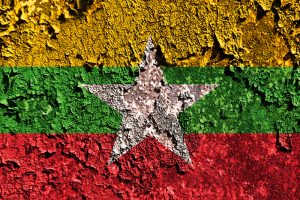On Friday, The Irrawaddy newspaper published an article that offered a curious insight into the inner workings of Myanmar’s military junta. The article claimed that Min Aung Hlaing, the head of the military administration, has this year spent more than seven billion kyats (around $33.3 million) in public money bestowing titles and medals on over 3,600 individuals in order to shore up his control of the country.
The Irrawaddy reported that Min Aung Hlaing had bestowed honorific titles on 1,290 people on Myanmar’s Independence Day on January 4 of this year, 877 people on Resistance Day on March 27, 146 people on Myanmar’s New Year’s Day on April 17, and 1,390 more on November 17. Hundreds more people received titles in the four days after November 19, bringing the total number of recipients to 3,603.
As The Irrawaddy noted, the practice of conferring honors was historically used by Myanmar’s monarchs “to guarantee allegiance from their subjects,” and has been continued over into the post-colonial era. But as The Irrawaddy added, “no one in Myanmar’s long history has awarded as many titles and medals as Min Aung Hlaing has done this year.” In doing so, the publication continued, “he has cheapened the entire honors system, as well as wasting public money as recipients of honors receive gold along with their titles.”
Naturally, the coup leader bestowed two of the more valuable honorifics on himself. These were the Sadoe Thiri Thudhamma (the Most Glorious Order of Truth) and the Sadoe Maha Thray Sithu, (the Order of the Union of Myanmar). The former, according to The Irrawaddy, “comes with a medal made with nine ticals of gold and a salwe, or belt, which goes across the right shoulder and chest, made with 31 ticals of gold. The medal also features a ruby with a diameter of 8.8 mm surrounded by a further eight rubies measuring 5.8 mm.”
There are a couple of interesting things that can be said about this, aside from the extent to which the military has grown into a gilded excrescence on the Myanmar body politic. The first is how precolonial patterns of symbolism and legitimation continue to permeate Myanmar’s politics. Witness also the Myanmar military’s decades-long patronage of Buddhist pagodas and monasteries. As Andrew Selth of Griffith University noted in a recent paper on the mindset of Myanmar’s military top brass, successive leaders have “invoked Buddhist concepts like karma to justify their ‘kingship’ and dampen down any prospective challenges to their rule.”
The second is the insecurity that it seems to betray, and the extent of the challenges facing the military junta. When the Burmese monarchs bestowed such honors in order to guarantee the allegiance of important local power-brokers, they also ritually reinforced the legitimacy of those doing the granting. The fact that such honors have been handed out in such serious numbers suggests both the fractious nature of the administration that the military government claims to control, and a deep-seated need to shore up that faltering legitimacy through symbolic acts of kingship.
However, it remains to be seen whether this system can be so easily reverse engineered, and whether legitimacy can be purchased via the dispensing of official baubles – especially for government that is so roundly opposed by the people that it claims to represent.

































